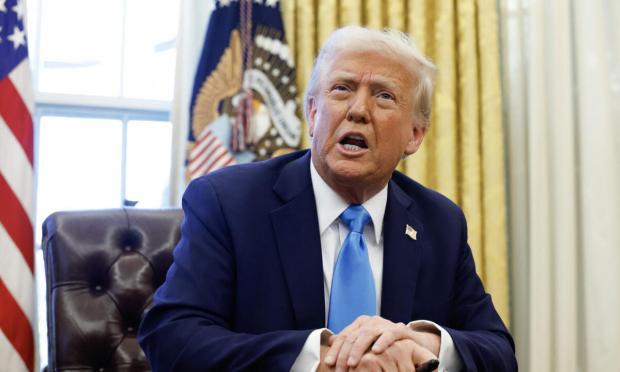Trump threatens to open the "gates of hell" for Hamas, giving an ultimatum for the release of Israeli hostages by 12:00 PM on Saturday, February 15, 2025.
Trump's threats to Hamas for the immediate release of Israeli hostages:
US President Donald Trump stated on Monday that Hamas must release all hostages held by the terrorist group in Gaza by the aforementioned deadline, or he would propose canceling the Israel-Hamas ceasefire to "unleash hell."
"As far as I'm concerned, if all hostages are not returned by Saturday at 12:00, I think it’s the right time. I would say, cancel the ceasefire and let hell break loose. I would say they must be returned by 12:00 PM Saturday," Trump said.
He said he wanted the hostages to be released en masse, rather than just a few at a time. "We want them all back."
Trump also mentioned that he could stop aid to Jordan and Egypt if they don't accept Palestinian refugees relocated from Gaza.
Hamas response
Meanwhile, Hamas senior official Sami Abu Zuhri told Reuters on Tuesday that Trump must remember that the only way to bring the Israeli prisoners home is to respect the ceasefire agreement between Israel and Hamas.
"Trump must remember that there is an agreement that both sides need to respect, and that is the only way to bring the prisoners back. The language of threats has no value and only complicates things," he said.
Trump's proposal for Gaza and Palestinians
These comments came after Trump's proposal for the U.S. to take control of Gaza once the fighting stops.
He stated that Palestinians would not have the right to return to Gaza under his proposal for the reconstruction of the enclave, which contradicts his own officials who had suggested that Gaza residents would be temporarily relocated.
In an interview excerpt with Bret Baier of Fox News broadcast on Monday, Trump added that he believed he could strike an agreement with Jordan and Egypt to take in displaced Palestinians, stating that the U.S. provides both countries with "billions of dollars annually."
Asked whether Palestinians would have the right to return to Gaza, Trump said, "No, they wouldn't because they'd have much better housing."
"I'm talking about building a permanent space for them," he said, adding that it would take years for Gaza to become habitable again.
In a shocking announcement on February 4 after meeting Israeli Prime Minister Benjamin Netanyahu in Washington, Trump proposed relocating the 2.2 million Palestinians of Gaza, with the U.S. taking control of the coastal enclave and turning it into the "Riviera of the Middle East."
Reactions from Palestinians, Arab States, and the UN
Trump's proposal for the displacement of Palestinians has repeatedly been rejected by Gaza's residents and Arab countries, and it was characterized by human rights advocates and the United Nations as an act of ethnic cleansing.
US Secretary of State Marco Rubio, who will depart later this week for his first Middle East visit since taking office, said on Thursday that Palestinians should "live somewhere else in the meantime" during the reconstruction, although he declined to explicitly rule out their permanent displacement.
The State Department did not immediately respond to a request for comment on the discrepancy between Rubio's and Trump's latest statements on the plan.
Rubio met with Egyptian Foreign Minister Badr Abdelatty in Washington on Monday.
Egypt's Foreign Ministry said Abdelatty told Rubio that Arab countries support the Palestinians in rejecting Trump's plan.
Cairo fears that Palestinians could be forced to cross Egypt's border with Gaza.
Trump's proposal "cuts short" Erdogan's plans for Gaza
Trump's unprecedented historical proposal for the Palestinians "cuts short" Erdogan's hopes of Turkey establishing a presence in the Gaza Strip.
The Turkish president had hoped that by playing the card of supporter of the Palestinians and Hamas, he could secure an expanded role for his country in the reconstruction of Gaza, as well as position Turkey as a security guarantor for the Palestinians.
Erdogan hoped this would allow Turkey to arm the Palestinians in Gaza and, subsequently, threaten Israel both from Gaza and from Syria, which he is attempting to turn into a military protectorate of Turkey.
The defense agreement between Syrian jihadists and Turkey, involving the granting of two Turkish military bases on Syrian soil where Turkish fighter jets will be stationed, combined with the equipping of the Syrian army with modern Turkish air defense systems and weapons, and the training of the Syrian army by the Turkish military, leave little room for doubt about Turkey's intentions against Israel.
In fact, Erdogan intends to involve "nuclear" Pakistan in the reconstruction of Syria by asking it to relocate its nuclear weapons to Turkish soil, supposedly for protection against Israel, from which his country is allegedly threatened.
However, the key difference is that Erdogan is the one threatening Israel's security, with fiery speeches against Netanyahu and the Israeli state, which he calls murderers and war criminals.
Trump's "crazy" proposal to purchase Gaza, displace the Palestinians, and turn their land into the "Riviera of the Mediterranean" sends a clear message to Erdogan and the world: the U.S. will not allow anyone to "insert themselves" into Gaza, and that Washington supports Israel above all else. This undermines Erdogan's ambitions and, if challenged, the U.S. would have no hesitation in using all means against him.





